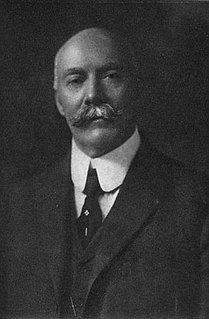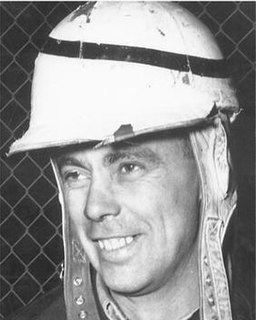A Quote by Agatha Christie
There is no telling what a human character is. Until the test comes. To most of us the test comes early in life. A man is confronted quite soon with the necessity to stand on his own feet, to face dangers and difficulties and to take his own line of dealing with them. It may be the straight way, it may be the crooked way --- whichever it is, a man usually learns early just what he is made of.
Related Quotes
The way in which a man accepts his fate and all the suffering it entails, the way in which he takes up his cross, gives him ample opportunity — even under the most difficult circumstances — to add a deeper meaning to his life. It may remain brave, dignified and unselfish. Or in the bitter fight for self preservation he may forget his human dignity and become no more than an animal
I suspect it was...the old story of the implacable necessity of a man having honour within his own natural spirit. A man cannot live and temper his mettle without such honour. There is deep in him a sense of the heroic quest; and our modern way of life, with its emphasis on security, its distrust of the unknown and its elevation of abstract collective values has repressed the heroic impulse to a degree that may produce the most dangerous consequences.
No man is so foolish but may give another good counsel sometimes; and no man is so wise, but may easily err, if he will take no others counsel but his own. But very few men are wise by their own counsel; or learned by their own teaching. For he that was only taught by himself had a fool to his master.
Only to two or three persons in all the world are the reminiscences of a man's early youth interesting: to the parent who nursed him; to the fond wife or child mayhap afterwards who loves him; to himself always and supremely--whatever may be his actual prosperity or ill fortune, his present age, illness, difficulties, renown, or disappointments--the dawn of his life still shines brightly for him, the early griefs and delights and attachments remain with him ever faithful and dear.
The problem of reconciling human suffering with the existence of a God who loves, is only insoluble so long as we attach a trivial meaning to the word "love", and look on things as if man were the centre of them. Man is not the centre. God does not exist for the sake of man. Man does not exist for his own sake. "Thou hast created all things, and for thy pleasure they are and were created." We were made not primarily that we may love God (though we were made for that too) but that God may love us, that we may become objects in which the divine love may rest "well pleased".
A man's character is like his house. If he tears boards off his house and burns them to keep himself warm and comfortable, his house soon becomes a ruin. If he tells lies to be able to do the things he shouldn't do but wants to, his character will soon become a ruin. A man with a ruined character is a shame on the face of the earth.
If an enthusiastic, ardent, and ambitious man marry a wife on whose name there is a stain, which, though it originate in no fault of hers, may be visited by cold and sordid people upon her, and upon his children also: and, in exact proportion to his success in the world, be cast in his teeth, and made the subject of sneers against him: he may, no matter how generous and good his nature, one day repent of the connection he formed in early life; and she may have the pain and torture of knowing that he does so.
God has made us so that we must be mutually dependent. We may ignore our own dependence, or refuse to acknowledge that others depend upon us in more respects than the payment of weekly wages; but the thing must be, nevertheless. Neither you nor any other master can help yourselves. The most proudly independent man depends on those around him for their insensible influence on his character - his life.
As soon as a man stands up and says he is right or his church is right, and all others are wrong, he is himself all wrong. He does not know that upon the proof of all the others depends the proof of his own. Love and charity for the whole human race, that is the test of true religiousness. I do not mean the sentimental statement that all men are brothers, but that one must feel the oneness of human life.
Whatever man may stand, whatever he may do, to whatever he may apply his hand - in agriculture, in commerce, and in industry, or his mind, in the world of art, and science - he is, in whatsoever it may be, constantly standing before the face of God. He is employed in the service of his God. He has strictly to obey his God. And above all, he has to aim at the glory of his God.





































